#and tackled SO well
Text
Seeing Astarion and thinking
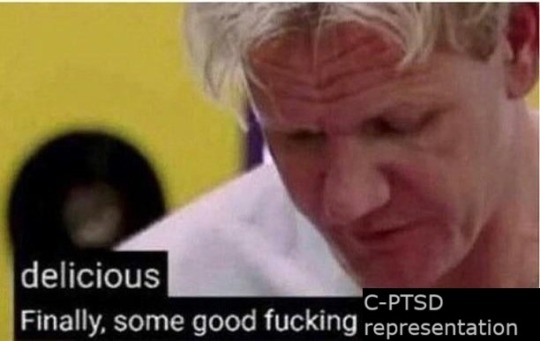
#bg3#astarion#c-ptsd#ptsd#seriously im so happy they did such a good job#i barely ever see good ptsd rep in general#so many ptsd characters get killed off as a sort of 'happy ending' and i hate it#and the rep for CPTSD is even scarcer#ive seen characters who *should* have c-ptsd but the writers just stick them with symptoms for regular ptsd#and even when there IS rep they stay away from the difficult parts of it#the ugly parts#the anger and the hard parts of healing#people want the gentle pitiable version usually#but this kind of ptsd involves such an emphasis on control#lack of trust#emotional dysregulation#its not pretty. its rough. its...terrible#i cant describe how happy it makes me to see those parts tackled#and tackled SO well#and he can have a happy ending#even though he cant walk in the sun...in a way it makes it happier for me to see#i have so many injuries from my abuser that will never heal#but i have to live with it and accept it#astarion has to do that too#but it doesnt make him less worthy of love#it doesnt mean he isnt worthy of happiness or that its unattainable#idk im just...not used to seeing someone have the same condition as me#ive seen very few characters outside of bg3 who had ptsd#and most of them were killed off#and it was painted as a happy ending for them and it makes me sick to think thats what people see for people like me
116 notes
·
View notes
Text
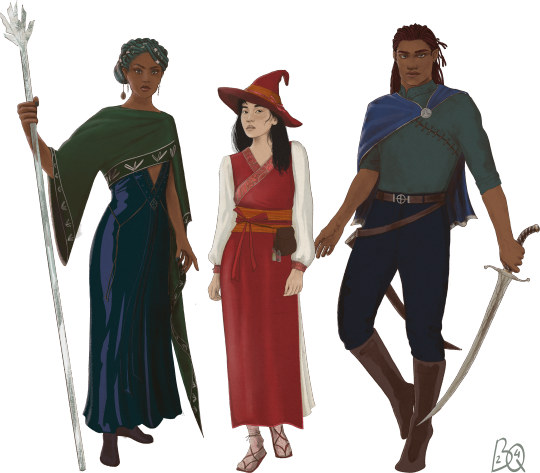
Suvi, Ame & Eursulon | Chapter 2
#worlds beyond number#wbn#wbn pod#took so long#will try to draw fox as well some time#time to tackle the chapter 3 looks?
591 notes
·
View notes
Text

my dogsred impression so far
#golden kamuy#gk#dogsred#ogata hyakunosuke#tsunemaru youta#tsunemaru has like 4 pages of dialogue so i may well be proven wrong in the future#as of now though i firmly believe he can and Would tackle ogata and break all of his bones easy
210 notes
·
View notes
Text
I feel like a lot of people in the fandom tend to forget this, so I'm just here to give a kind, thoughtful reminder :]
Ambrosius Goldenloin in the movie is an East Asian man (Korean-coded), his skin is tan, his eyes are monolid and his nose is big
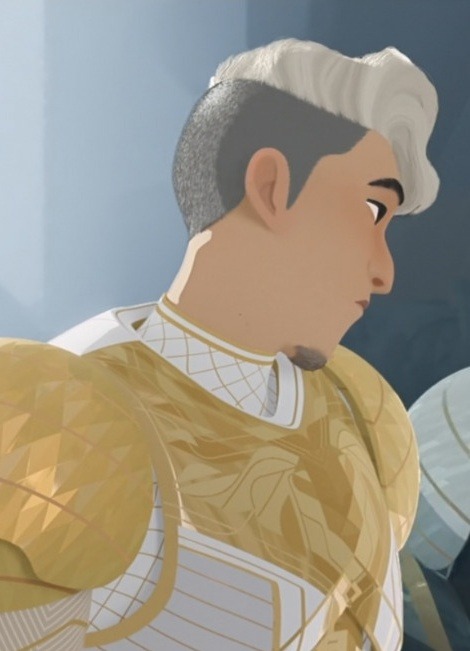
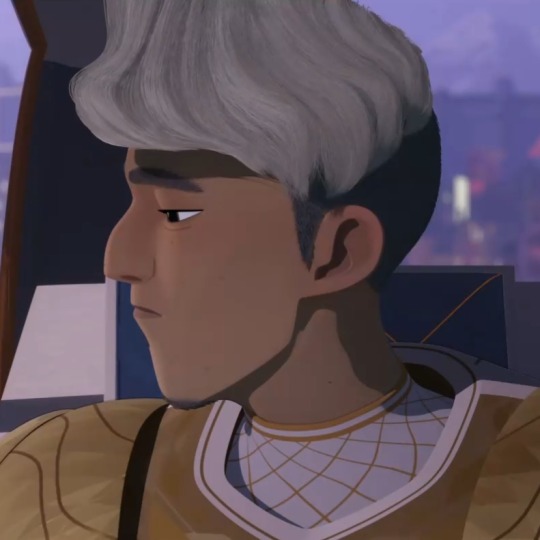
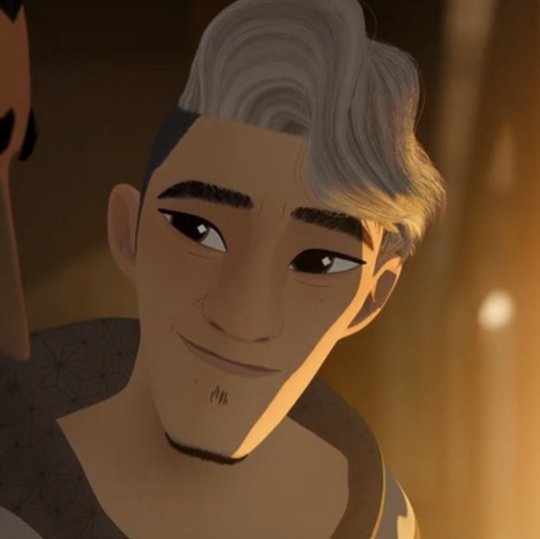
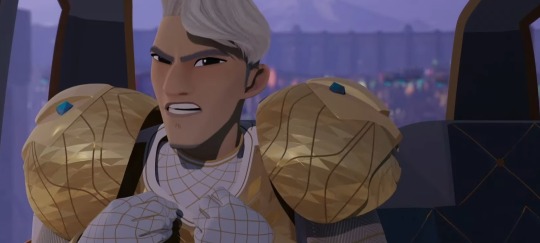
He's voiced by Eugene Lee Yang - a Korean-American actor who also has Chinese and Japanese heritage. Eugene Lee Yang looks like this:
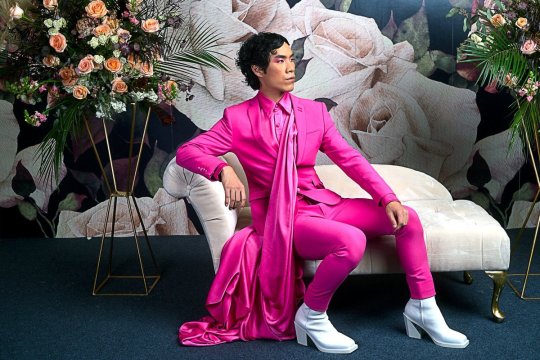
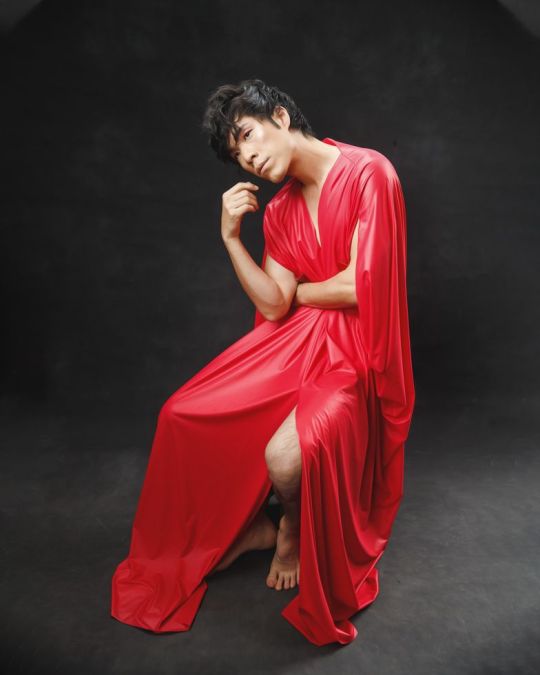

During the production, when Ambrosius was decided to be East Asian, artists looked up queer East Asian-American men, and based Ambrosius off of them. Ambrosius is literally drawn to look like Eugene Lee Yang
Please draw him as such, thank you
#nimona#ambrosius goldenloin#no but its so annoying bro#why do people literally forget hes EAST ASIAN#AND HIS CHARACTER TACKLES THE “MODEL MINORY” MYTH EAST ASIAN IMMIGRANTS WERE MET WITH IN USA#race in nimona is important because as one person said#you cant make a movie about a police state and not touch upon the race subject#HE IS EAST ASIAN#PLEASE IF YOURE DRAWING NIMONA THE MOVIE FANART (in the comic hes white yea) THEN PLEASE LEARN HOW TO DRAW MONOLIDS AND BIG NOSES I BEG#why am i so pressed abt this??#he looks like me bro#his features are my features and im not joking#so when i see ppl erase them#its not well for my self-esteem lets put it this way#please stop erasing his race while drawing#thank you :)#ofc i havent made this post bc of one person who blogged that Golitzine should play Ambrosius what r u talkin abt#Golitzine is a slavic man hes russian#a russian prince#ambrosius is east asian#plus we dont need a nimona live action itd be stupid#a short animated film abt bal's and ambrosius's childhood? sure#thats it#live action remakes SUCK#can you believe i made this post purely out of spite
513 notes
·
View notes
Text
it's for a tiktok, they said... it'll be funny, they said...
[ pls do not repost . reblogs are ok ]
images under the cut !

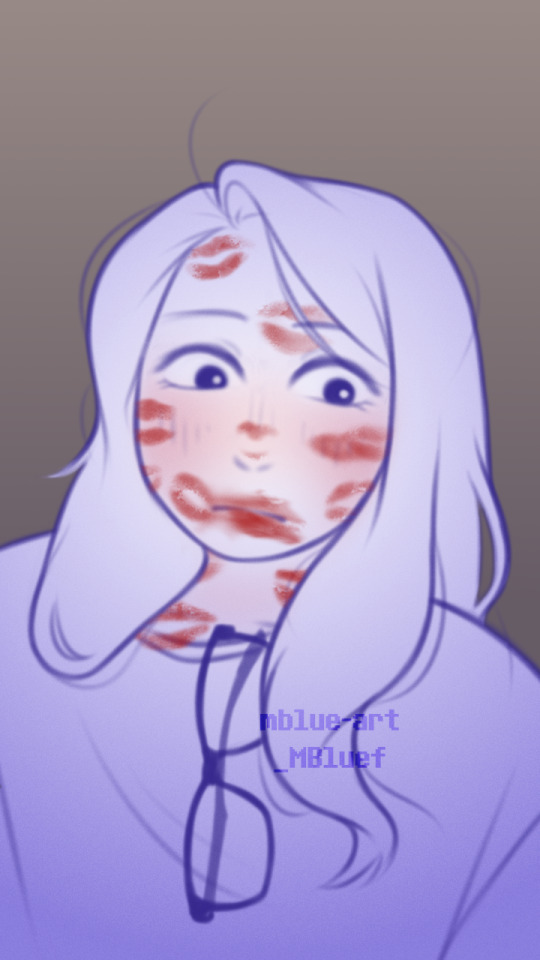
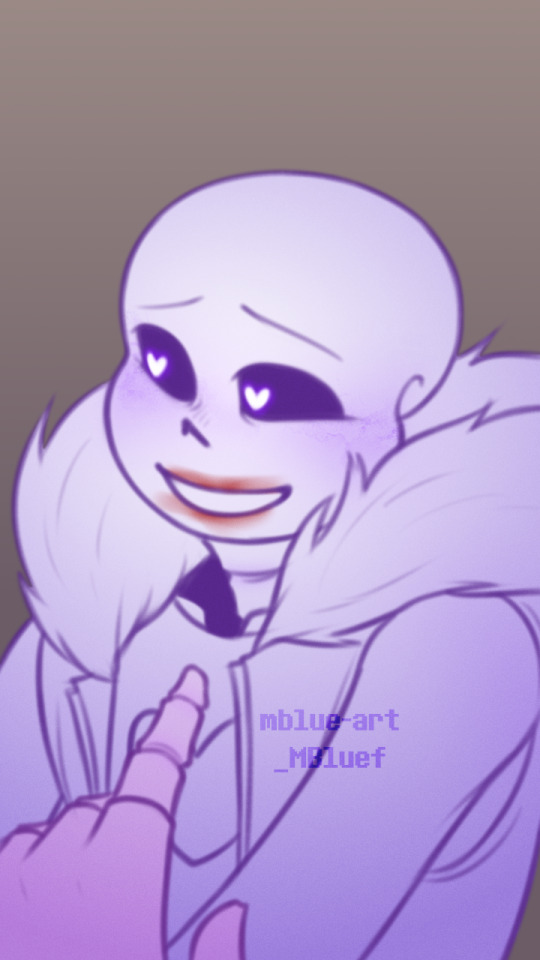
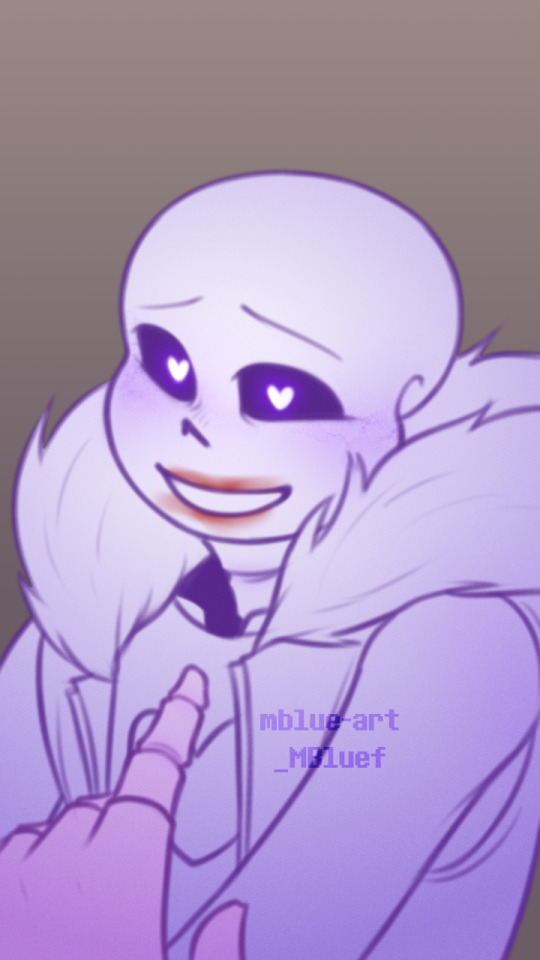
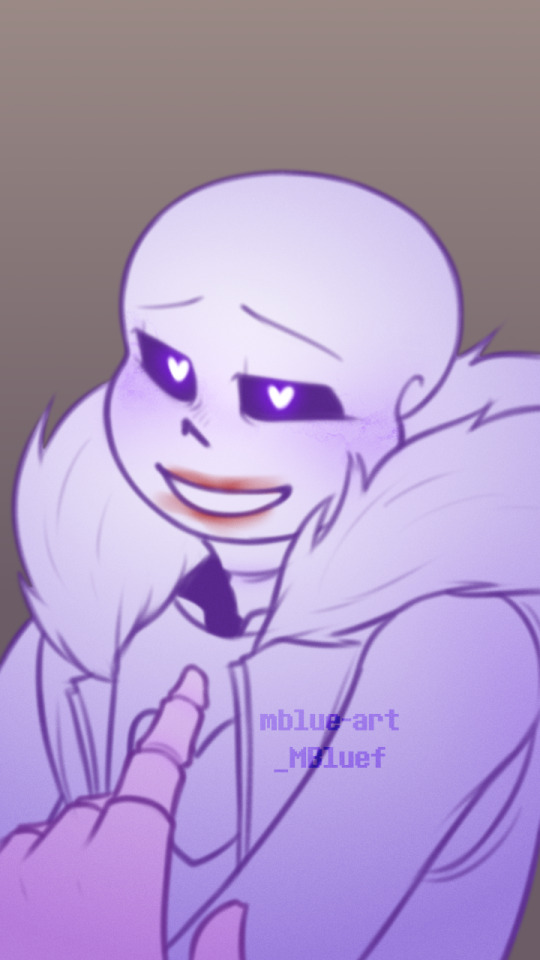

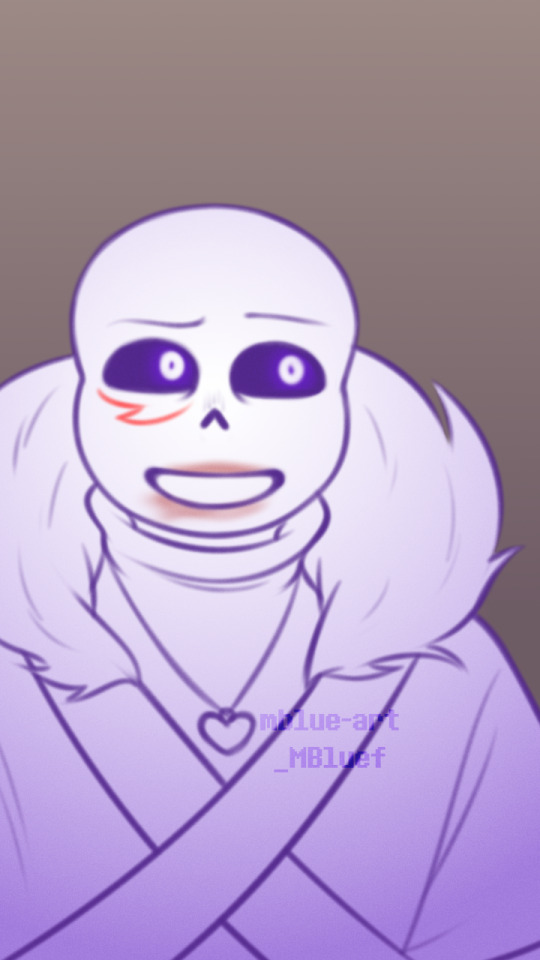
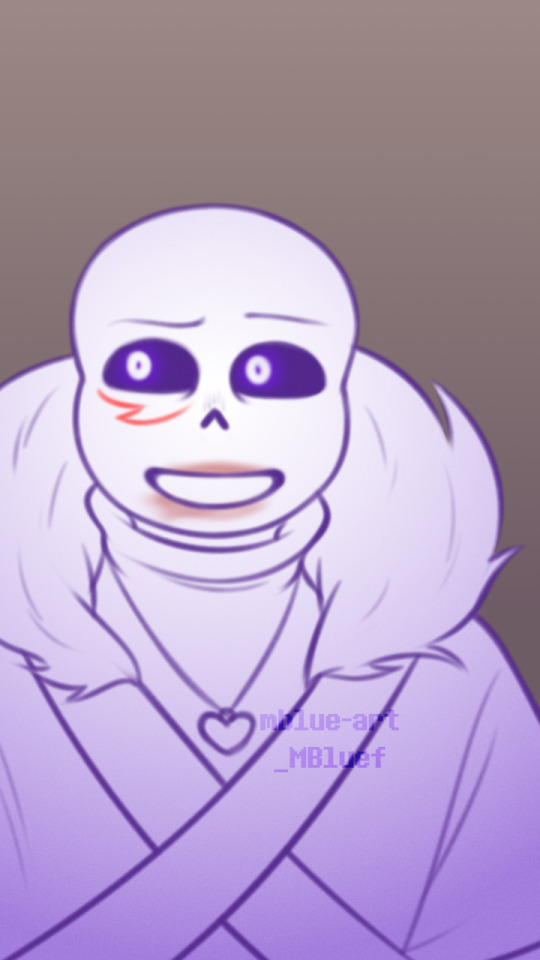
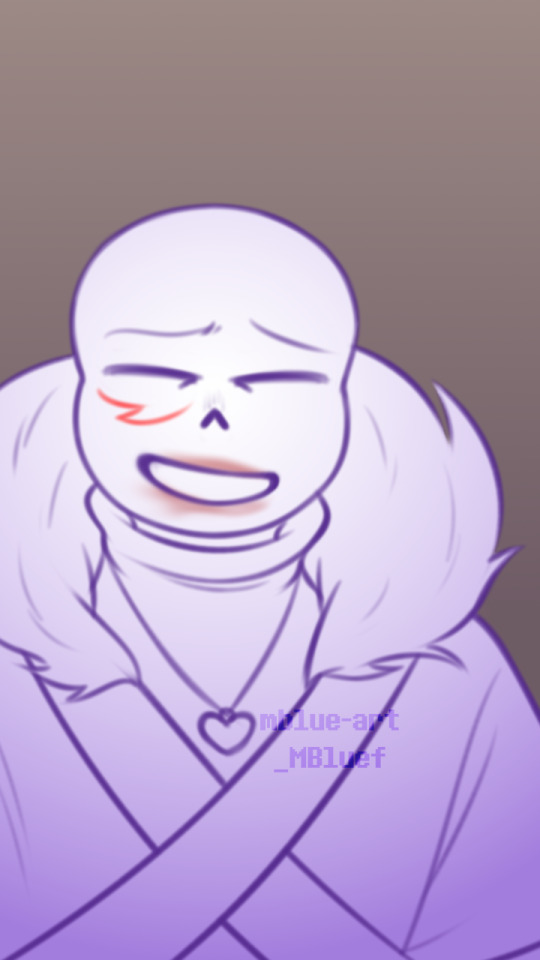
#epic!sans#self insert#lust!sans#killer!sans#cross!sans#mblue art#video#yeah sure... they def didnt use this as an excuse to plant kissy marks on my face......... (¬////¬)#(tried a thing and uhhhh ya!)#(i wanted to do this one so i tried to speedrun it or smt)#(i thiiink this is my first video art thing WOOH)#(edit: NO WAY I ACCIDENTALLY POSTED SMT EARLIER AGAIN RRRR HSHDHDB)#(anyway hi. im alive and well i just do not have the spoons to socialize/do stuff lately. the demons got me 💀💀💀)#(i see those snm asks tho!!! gonna try to tackle those next if i can)
261 notes
·
View notes
Text
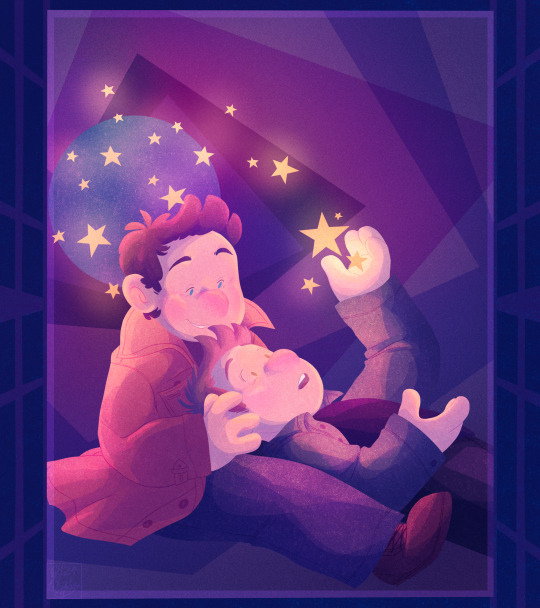
Starry Eyed Surprise 💖💫
[lineart included in Destiel Doodles coloring book]
#spn fanart#destiel#dean winchester#castiel#supernatural#spn art#spnfanart#wiggleart#this was another page I was excited to tackle lol#I usually do the stars for Cas’ halo but when making it for the coloring book#little dots or flares would be difficult to color and wouldn’t translate well#so I made them bigger stars instead and I loved coloring that lol#I also like the idea of dean just being entranced by the halo or playing with it bc it’s stars lol
259 notes
·
View notes
Text
I am not the same person I was before seeing this scene in particular (Major Spoilers for The Sign!!!!!!)
[Video ID. A clip from the Bluey episode “The Sign,” Lazarus Drug by Megan Washington is playing which drowns out all other sounds and dialogue. Bandit looks sad as he’s about to open the drivers side door to the family car. Chilli is in the front passenger seat also looking sad. She looks at Bandit just as gets a call on his smartphone and silently excuses himself to take it. The phone conversation starts as Bandit walks around to the other side of the car from the front. He continues to the sidewalk a few yards away from the car. Chilli looks at Bandit right before the phone call ends and Bandit puts down his phone with a surprised look on his face. He slowly walks to the large “For Sale” sign in the front yard before ripping off the big yellow “Sold” sticker, which confuses Chilli and gets the attention of Bluey and Bingo in the car, Bingo with a raised brow looking confused. Then Bandit turns to look at his family in the car, contemplates for a moment, then dons a determined expression. He then turns back to look up at the “For Sale” sign with clenched fists as we see the sign tower over him, casting a shadow. After a moment, he looks level at the sign and then fiercely grabs the sides of it as Chilli, Bluey, and Bingo look on in shock. He starts to gradually pull it out of the ground with all his might with clenched teeth, a furrowed brow, and a slightly quivering lip. After he finally gets it out, Chilli, Bluey, and Bingo stare at him, eyebrows raised and mouths agape. As the lyric “as I start to break into a billion pieces” plays, Bandit looks backwards, turns a bit, hobbles backwards a bit, and then throws the sign into the middle of the cul-de-sac with what seems like a yell, looking down angrily at it. Zoomed in, Bandit pants for a moment before Chilli tackles him to the ground when the word “shatter” is sung in the song. From an aerial view, Chilli and Bandit are on the ground and Chilli seems to be crying into Bandit’s neck while he grins, putting a hand on her arm. End ID]
#bandit simps come get your juice#and like it’s not even that for me#it’s the emotional weight of it#how Bandit’s kinda been away for most of the episode and only now we see what he’ll ultimately chose in the end#and the MUSIC and how it SYNCS UP so well with the animation!!!!!!!#the way Chilli tackles him#and like we’ve never really seen Bandit like this before#just#what a beautiful scene#thank you Megan Washington for the music!#I’m gagged fr#Bluey#the sign#bluey the sign spoilers#bluey the sign#video#Bluey clip#bandit heeler#chilli heeler#bluey heeler#bluey spoilers#bingo heeler#Megan Washington
72 notes
·
View notes
Text
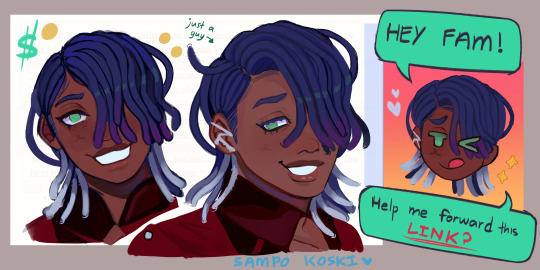
testing out a new hair style for this freak 🙄
#my art#sampo#sampo koski#hsr sampo#honkai star rail#hsr#samposting#how we feelin abt sampo with locs fellas. not exactly sure how im feelin abt it yet but we move. will tackle butterfly locs next... hm#im of the belief that hes in the 30 - 35 age range so i will try to work on showing that more... gave him tiny eye creases for now#black artists#artists on tumblr#will reblog again later or whatever. testing timezone posting to a small degree as well. but not really
207 notes
·
View notes
Text
Penciled Lines
(Cross-posted on ao3, if you prefer to read it there. Reblogs still appreciated!)
Missa wakes up, and he thinks he might be doomed. This doesn’t scare him nearly as much as it should.
Missa is awake early—by his own metric, anyway. His nocturnal nature causes “early” for him to mean “early night” and not “early morning.” Regardless, “early” means that Philza is not asleep yet, still going through his nightly rituals. “Early” means that Philza is sitting up in (his? their?) the bed, pillows propped up behind him, notebook in his lap, sketching away.
And when Missa wakes up to the soft scritch-scratch of a charcoal pencil on textured paper, his forehead just so happens to be brushing Philza’s hip.
Missa can hardly breathe.
Oh no.
He knows that if he gives any indication that he is awake, Philza will stop sketching, close his notebook, shift himself over until he is politely seated on his side of the bed, and greet Missa with a friendly smile. Philza has done it before, when Missa wakes up early. That’s how Missa knows he’ll do it again.
Thus, Missa can hardly breathe—his breaths have to be the slow in-out of sleep. He can’t so much as twitch, either. He has to keep quiet and play dead or else he’ll be found out. Seen. Caught living the lie.
“Husband,” Philza calls him. They’re not married. They share a bed. They’re hardly ever in it at the same time. They have a son and a daughter. Neither of them know Missa very well. Philza has had an extra set of armor and a skull on his backpack for months, waiting for Missa. Missa doesn’t even know Philza’s last name.
Philza is a good man and a good friend—and Missa doesn't deserve him. Still, he takes what he can get. Curls around it. Hoarding every innocent kindness Philza extends like a starving creature: the generosity of a backpack fully stocked with equipment; the trust Philza places in Missa to watch the kids when he’s asleep; and now, the courtesy of not moving his hip from Missa’s forehead to ensure his “sleeping” isn’t disturbed. Missa clutches all of these little offerings in his greedy claws and hugs them into his chest, even as the guilt eats away at him.
Because, regardless of the lack of mutual feeling, he loves Philza. He loves him so, so much, and that is why he is doomed. He can’t afford to lose what little he has. He can’t cross that line.
So Missa lies beside Philza, forehead pressed against Philza’s hip, pretending to sleep so he can imagine that they’re not just lying in bed together, but lying in bed, together; and later, when Missa truly wakes, he will sit on his side of the bed and look at Philza’s face soft with sleep and think about how lucky he is that he still has a side-of-the-bed to begin with.
Missa doesn’t mean to drift off. When it starts to happen, he’s hopelessly torn between shaking himself awake and thus giving himself away, or remaining how he is, silently fending off the inevitable. In the end, Missa clings to that scritch-scratch sound of Philza’s pencil on the paper for as long as he can before the fog at last pulls him under.
Eventually, he dreams. In fact, he dreams of the calloused fingers he dreams of every night, hands like his own, an artist of Death, cradling and shading the contours of his face—a softness dashing charcoal across his jaw, and over his cheekbones, and perhaps on his lips, too, if he’s lucky. Defining every edge of him.
~*~
A deep sigh. Phil stops sketching as Missa shifts in his sleep. He tilts his head up so that the tip of his nose is now just nearly brushing against Phil’s hip. The motion disturbs the wild splay of his dark hair, revealing more of his face: eyelashes, cheeks, warmth. Tender blush of something Stygian and otherworldly. New.
Phil’s lips tilt upwards. He turns to a fresh page, and he starts again.
#qsmp#pissa#qsmpshipping#qsmp missa#qsmp philza#i hesitate to put main character tags bc it's shipping content but i think we're all p much okay with that?? we chill??? we chill thumbsup#my fics#ficlet#anyway would you believe me if i told you this took me a week to write. hhourgh.#i'll prolly make small edits as time goes by if i dont scrap this version entirely.#i really like it rn but we'll see how i feel abt it in like a couple hours or a day. the sheer number of times ive rewritten this hhhhh.#this little character/relationship study is primarily for me to try to work them out in my head.#so if this doesnt quite hit the exact vibe you know why.#im still getting acquainted w missa's character but i gotta start somewhere ya know#i didnt actually get to explore missa's feelings of inferiority as much as i wanted to but thats bc i found trying to tackle that As Well-#-as everything else saddled the fic/setting w too many Things and made it cumbersome and muddied the story being told.#so another time perhaps.#anyway i adore them. beloveds.
174 notes
·
View notes
Text
thinking about the fact that MK was probably really REALLY close to going monkey mode during the shadowplay episode...
#Monkie Kid#like when he finally breaks a bit after being tackled by the shadow versions of the others#the electric energy + the glowing eyes + jumping up??#those are all EXACTLY the same as what MK did the first time he went Monkey Mode#so.... he was probably REALLY close to it right then and there#tbh if you really think about it that's happened in response to macaque quite a few times#you could count MK tossing the staff at him in ep9#as well as him leaping up into the air before transforming in s3 ep4#Macaque is just great at bringing out peoples primal rage i guess#can you IMAGINE if he had turned into a monkey for the first time during that episode though#without any real buildup to it???#that would've been NUTS
61 notes
·
View notes
Text

;R1999 FORGET ME NOT - General Headcanons

Compilation of headcanons and analysis on Forget Me Not as a character and other related things.

this post was brought to you by me, procrastinating on the second part of the Cover analysis and those yandere Pavia headcanons, and ALSO because mister lawrence cavendish jr is the second target for my brainrot
warning for suicide and self-harm themes!

On the subject of Forget Me Not's name and past.
It's Lawrence Cavendish Jr. Forget Me Not's real name is confirmed to be just that, as seen in this specific excerpt:

"Cavendish Jr, who was still alive and once sat in front of you [...]" which alludes to the dinner Vertin had at the Walden with Druvis III and Forget Me Not, and "'Forget Me Not', what a hilarious, stupid name". I only included this because I've seen people wonder about it.
What I mean to tackle in this point is the relationship between Forget Me Not, his origins and his current chosen name. Despite his calm and collected appearance, it becomes clear that Forget Me Not is one hair away from becoming entirely deranged, especially when confronted with the possibility of getting revenge. But why is Forget Me Not so focused on revenge specifically?
His backstory is not as openly laid out for us to read, but we can gleam some bits and pieces from all the documents and dialogue he has. To understand Forget Me Not, we also need to look at Druvis III.
All throughout chapter 02, we see parallels and connections being drawn between Forget Me Not and Druvis III - both of them appear to be extremely aloof, cold and collected, only to be revealed to be very emotional deep down, for better and for worse. Druvis III is initially defined by the neutrality and inertia that comes with being stuck in the past, while Forget Me Not is initially defined by the neutrality of the Walden and his ties with Manus Vindictae, an organization that rejects the future.
Druvis III is a disgraced, fallen noble whose life wasn't ruined by the fire that took her family, but the perception the world had of her, an image they forced onto her due to their hatred towards arcanists. And Forget Me Not has a family surname "buried in the dust, shot dead in history". A disgraced, fallen noble implied to have struggled with poverty, battling hunger and suicide countless of times. In the "··· Formula: 1920s" document, we can see a few pieces from various people and their opinions on Forget Me Not from the Big Mouth Bulletin. 3 out of 4 want him dead or think of him as a monster - entirely because of his existence as an arcanist.
The similarities are obvious. Hell, both share the theme of flora and plants, too. There is an even more subtle dynamic here too, alluding to the game's prominent religious imagery - Vertin's suitcase being compared to an ark that will brave the "Storm", the last supper moment, Arcana's offering, the orange, being a replacement for the apple of Eden...
And then, Forget Me Not association with snakes, rumoured to have a body covered in scales, with an arcanum skill that allows people to indulge in alcohol during the Prohibition Era - the snake that tempted Adam and Eve. Druvis III is associated with forests, trees, as well as a link between Vertin (the good guys) and Manus Vindictae (the bad guys) - the Tree of Knowledge of Good and Evil. The two go hand in hand and are linked together.
The big difference between them is that their respective quests to set things "right" are entirely different - their "revenge" is not the same. Druvis III was hellbent on finding out who set the fire that killed her family, not because she wanted them to face the consequences, but because in doing so, people would finally leave her alone and let her mourn. She could finally move on from something that she knew the truth of. Forget Me Not does it to feel satisfied with himself and get back at everyone who ever looked down on him or wronged him. To inflict as much as pain unto others as he had received before. It's a powerplay fantasy in which he finally wins, against all odds.
It's unclear what truly happened to the Cavendish that caused Forget Me Not to end up in such conditions, to the point where he'd go as far as make sure no one can trace him back to his family, to the point where not even the Foundation has a proper report on him.
But there is one line in particular that lives rent free in my head when it comes to the Cavendish and Forget Me Not's potential relationship with them.

This takes place after Druvis III loses her forest, after she loses her eternal branch because of Vertin's intervention during their dinner. They're talking about how to use her forest to build a refugee camp.
There's the possibility that Forget Me Not is simply alluding to that forest - something that used to belong to her is now something that he should have for the sake of Manus Vindictae's goals.
But! Indulge me for a second! There's a noticeable pause, there's a subtle tone to his voice. Reverse 1999's writing might be confusing at times due to the translation, but it's easy to see that it's loaded with metaphors, hidden meanings and so much more, to the point where reading deeply into everything most characters' say is pretty much the norm.
The dialogue that precedes that specific line is Forget Me Not insisting that he can transfer the ownership of the woods over to Druvis III anytime, because she has always been and will always be the only owner, no matter what. He does this to convince her to go through with Manus' plans, that's his main goal, he doesn't care about the woods. But that single line pictured above? It could mean so much more.
Again, the two share many, many similarities. So when Forget Me Not talks about what Druvis III once had - a prestigious family business, a name people can recognize, an assured future - is what he should have, it evokes a sense of entitlement and lingering resentment. Almost as if Forget Me Not's desire to go back to the past doesn't stem from nostalgia like her, but to reclaim something that was denied to him.
Which is incredibly ironic to me because both of them carried their family in their names - Druvis THE THIRD. Lawrence Cavendish JUNIOR. And yet, the one that worked so hard to obscure his origins and changed his family name was him.
Neither of these characters can be recognized nor traced back to their families by appearance alone - people need a name or a really good memory to truly recognize them. The only one with enough courage to continue carrying such burden is Druvis III. Forget Me Not wants something that he willingy lost the right to the moment he allowed Lawrence Cavendish Jr. to die and fade into obscurity.
The name "Forget Me Not" begins to sound more ironic. Like an order, a threat or the promise of his return - his desire for revenge and his hypocrisy become clear once you begin to dissect his character. Like the narrator in the "To Lawrence Cavendish" document says: "He is patiently waiting... to put his meanness, craziness and quivers under the sun". He's waiting to reveal himself.
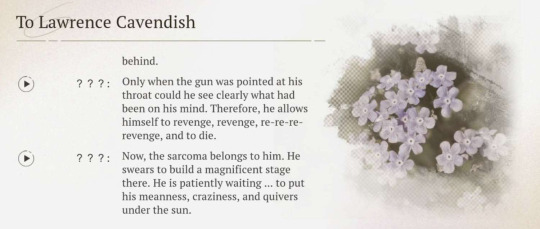
The "stage" is shown when he makes people explode from inside out, a lot of people who recognized him as Forget Me Not, the mixologist. This is when we finally see his true intentions and the main difference between him and Druvis III, all in their respective reactions to the journalists.
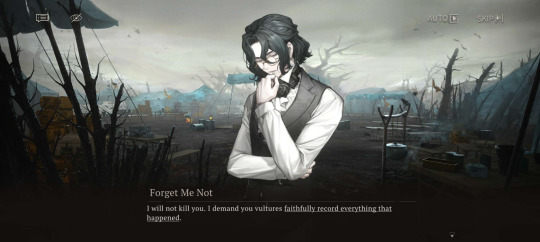
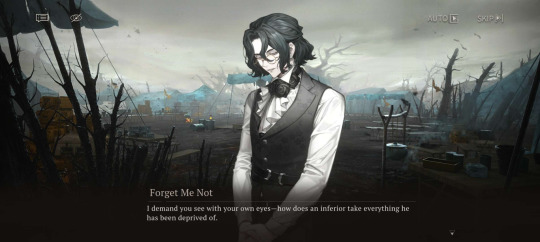
She's terrified, thinking about the day of her family's funeral. On the other hand, he's ordering them to watch and record as he "takes everything he has been deprived of".
This is why the thing that breaks Forget Me Not is hearing that Druvis III does not care about the man who started the fire, that it's not important anymore. He believed them to be on the same page, that she would love to torture the single person responsible for all of her grief. The guy is projecting heavily onto Druvis III.

In the end, I don't know if Forget Me Not resents his father, his family name, if he had some sort of business to inherit and a "future" that was taken from him, or if they actually might've been a happy family.
What I do know is that Forget Me Not's desire for revenge was absolutely amplified and fueled by Manus Vindictae's own agenda. And that's why he works perfectly as both a victim of their MO and a willing member within their ranks.
He clings so hard to the past because there is no future worth fighting for, because everything would be much better if it was rebuilt from scratch with only those that won't oppose him and repeat history. He clings so hard that his new name and identity are, in the end, a plea for the world not to forget who he used to be and, at worst, an order because he sure as hell hasn't forgotten all the things others have done or said Back when Lawrence Cavendish Jr was around. Once his family outlived their usefulness or relevance within society.
TLDR: THIS is the cold-blooded, numb murderer who is actually very sad, empty and broken deep inside that some people wanted Pavia to be. Like, he's even sopping wet and sad and asking Vertin to kill him next time they meet.
Which leads us to my next point!
On the subject of Forget Me Not's self-destructive and suicidal mindset.
We've talked about Forget Me Not's views and relationship with the Cavendish - but what exactly is the end goal? He feels entitled to a better life, one he was supposed to have, and then what?
The "???" narrator mentions a woman who made a promise to Forget Me Not, as well as leaving a "sarcoma" behind which he then adapted and turned into his own. This woman is implied to be Arcana, as we see her talk to Vertin about being able to see the truth, to not be blinded - there's an emphasis in the way she recruits people by opening their eyes to reality. The sarcoma is the city (apparently "Windy City" is used to refer to Chicago, I had to google that but hey, that's pretty neat!). It's the world he lives in and that wants him gone. She focused Forget Me Not's grief towards it because in doing so, it would help Manus Vindictae's ideals of a world exclusively for pureblooded arcanists.
And even so, he remained suicidal. There was at least one more attempt at taking his own life, and that's when he saw "what had been on his mind". Whatever that might've been, no doubt influenced by Arcana and his situation, is what pushed Forget Me Not to "allow himself to revenge, revenge, re-re-re-revenge, and to die".
Ultimately, Forget Me Not's goal is to die at the end of it all - even after he gets his revenge, earns the life he wanted, takes back everything that was meant for him. This is why, after he's fully defeated, his last words to Vertin are to show no mercy next time they meet. To kill him.
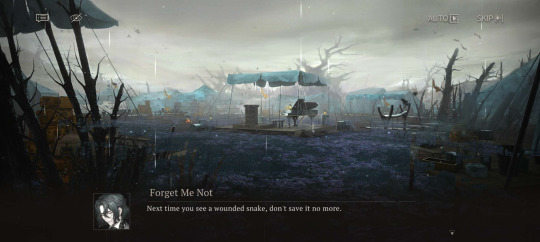

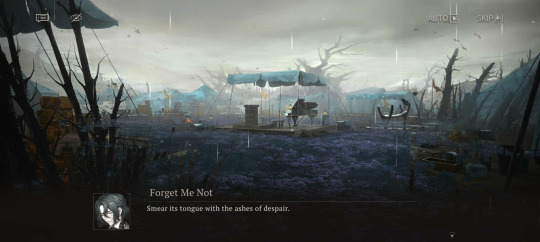
This is not only a long and convoluted plan of revenge, it's Forget Me Not willingly marching into his own demise. And just like before, he's not strong enough to pull the trigger himself. Now that he has no solid argument to justify his anger - all because Druvis III has shown him that people can, in fact, move on - his only option is to have someone else end his life. He's shown tired, and the phrase "Don't save it no more" might indicate that even if there was someone who could repeat what Arcana did to him - give him a sense of purpose and a target for his grief - he simply doesn't have the energy for that.
Forget Me Not's self-destructive tendencies can also be seen in other ways. His job at The Walden is to cater to all the people who shunned him - he welcomes everyone and anyone for the sake of creating a network of secrets, he attends fancy parties and events full of those who call him a drug dealer, Satan's spawn and so much more. And he pretends to be someone else entirely while wishing for others to remember him. He willingly surrounds himself with all the things that hurt him.
His arcanum being related to alcohol is rather poetic to me - since Forget Me Not is said to have spiraled into decadence and into this extreme mindset, it makes sense that his main skill is related to being intoxicated and to drown into something that is largely hated but at the same time, desired and coveted. The Prohibition Era does have a very similar mentality to religion, namely western ideologies - you're meant to openly reject and loathe something, but the constant repression causes you to yearn for it instead. And at some point, this repression can become an addiction in itself, leading some to indulge in it. This loops back to Forget Me Not's association with the snake in the Garden of Eden.
It makes sense to me that he indulges in something so painful, while cohercing others into indulging in forbidden alcohol. That he later uses this very same arcane skill to kill all those people who, in his eyes, represent everything he loathes about the current state of the world. It's like a sarcoma that he now leaves behind, that kills from inside out.
And this is the last time I'll bring up Druvis III in a Forget Me Not post, but notice their choice of flower/plant? She has a mistletoe bouquet - a parasitic and toxic plant which represents positive things such as fertility, life and protection in many different cultures. Forget Me Not has black roses, roses being immediately recognized as one of the most beautiful flowers but, in this context, symbolizing things such as death and rebirth, remembrance, mourning. Their duality, contrast and the "two-faced" aspect is prominent there. And not to get very deep about character design, but Druvis III holds the bouquet very carefully and carries it around with her willingly, whereas the black roses that Forget Me Not wears wrap around his neck not unlike a noose.
To really drive home how Forget Me Not sees himself, here's the description they gave him for his boss fight.
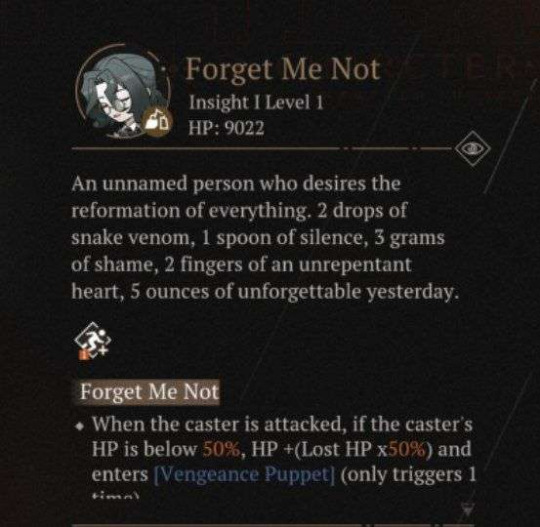
They boil down his character perfectly, to all the little traits that make up his whole emotional baggage.
And to also put more emphasis on how Forget Me Not truly doesn't expect to live and "win" at the end of this whole revenge trip, here's his ultimate - "Heavengazing from Hell". He's fully aware that he's going to be destroyed by his own actions and that the only thing left for him will be to look up at heaven from hell. That all the good things will forever be out of his reach.
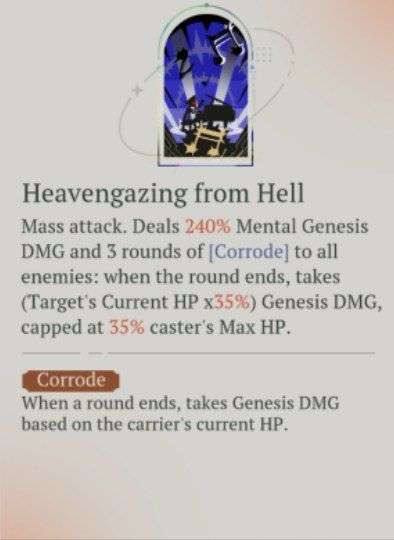
Now, onto proper headcanon territory, since I'm running out of media to analyze!
On the subject of Forget Me Not's scales.
As established before, Forget Me Not is associated with snakes - one of the segments from the Big Mouth Bulletin comments on this. "[...] he had scales under those long sleeves, one next to another embedded in his flesh."
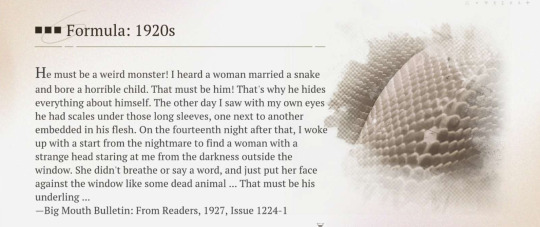
And this can actually be seen on his in-game sprite! It's very faint, but there's absolutely some sort of texture peeking out from under his collar and sleeves that resemble scales. They can also be seen on the trailer animations. The only time these scales don't appear or peek out from his clothes are in The Walden illustration, with the other members of Manus Vindictae, but that can easily be explained as him covering up properly and the angle he's drawn in.
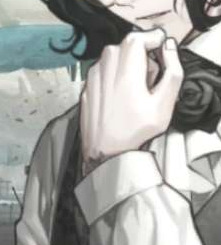

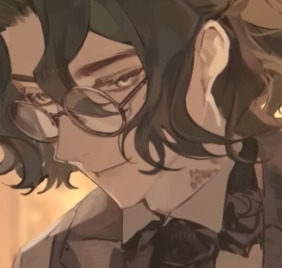

Originally I thought that they could be burn scars, as it would mean a stronger connection between him and Druvis III. But upon closer inspection, they don't look like burn scars at all.
I like to headcanon that it's a side-effect from his own arcanum, similar to how Rabies is implied to look like a scarecrow because of his involvement treating rabies. Being something "self-inflicted" - in the sense of him having the choice to stop and heal, but refuses to - also lines up with Forget Me Not's suicidal tendencies, the whole sarcoma metaphor and the fact that by carrying on like this, he's doing nothing but destroy himself and add to his suffering.
As for how far the scales have extended, I don't have a set favorite idea! Part of me really would love it if the scales coiled around his body like actual snakes, but also the idea of him having different patches of scales scattered throughout (again, like a sarcoma) and the third secret option of him being MOSTLY covered in them to the point where it becomes grotesque, something that he can't even look at.
They're not just a tattoo or pattern embedded onto his skin either - they're actual scales, cold and rough to the touch. The areas affected by this have grown numb, making it hard for Forget Me Not to feel any warmth or pressure applied onto them. This adds to that otherworldly and sinister vibe he's got going on, even if the lack of proper tactile sense irritates him. It's extremely uncomfortable if they're brushed or rubbed in the wrong direction, however!
Sometimes, Forget Me Not might pick at the scales, as if deciding whether he loves or hates them. In particularly bad days, he picks them out. I like the idea that, once picked, the scales grow faster and stronger, as well as in broader areas, making it a perpetual loop of picking them off from his skin.
Overall, it would be extremely easy to conceal them - he only needs a shirt with a higher collar and gloves or some make-up, but I like to think that Forget Me Not loves the idea of someone catching a glimpse of them, a reminder that he's dangerous and so much more than meets the eye.
As much as he he's been affected by the stigma against arcanists, he now thrives in their hatred for him and his existence - sneaking into places he knows he's not welcome is addictive, especially knowing everyone tolerates him because he's their only access to alcohol. The way everyone will turn around and talk shit about him once they're out of The Walden is fun, because it reinforces his views on why this current era deserves to be rebuilt from the ground up.
Forget Me Not has extremely poor eyesight.
I know the glasses look thin and pretty standard, but I just like to think that Forget Me Not can't see shit without them.
He has this habit of taking them off to "clean" them whenever he's talking with those he loathes - mostly humans - just so he doesn't have to look at them directly. Sometimes, he might just close his eyes and dissociate, pretending to pay attention if the situation calls for it. Yes, he's petty and hateful enough to feel physically sick when talking to people he hates.
If you pay enough attention, it becomes clear that eye contact becomes scarce, as if just looking at them will send him into a fit of rage (but he conceals it extremely well when needed).
Forget Me Not's poor eyesight is not a secret, and he often likes to make patrons nervous by making their drinks without his glasses - of course, he knows his way around drinks and potions, there's no chance of him messing up, he could do this with his eyes closed. But seeing customers squirm is such a delight. Because now, they must choose between making a scene in HIS territory or risk being poisoned with a poorly-made drink.
I like to think that he also just has a very fine ear, since he does play instruments (all of his attacks being related to music and him using a piano as his wand during the boss fight). So really, Forget Me Not couldn't care less about his eyesight.
Forget Me Not enjoys floral arrangement.
This is just based on his association with the actual forget me not flower. I think he enjoys creating bouquets or putting up vases full of flowers around his home, even if all of them may end up creating a very gloomy and decadent atmospere - they're perfect for funerals, and he simply may be preparing for his own.
And he leaves them out on display long after they've wilted. "They're more beautiful this way", he'd say.
It's not rare to find Forget Me Not on rainy afternoons with a pair of scissors on hand, absentmindedly cutting every leaf and petal off from all these roses, as if he had a personal vendetta against their colorful hues. Sometimes, he just twirls the stem around, pressing hard on the thorns to feel anything while he looks out the window. He's so very fucking dramatic and volatile.
Basically, I like to picture Forget Me Not as the type of person who has dedicated so much time into something as empty as revenge, that he absolutely has no idea what to do outside of that.
Everything he does is just a way to pass the time until he can go back to dedicate every waking second of his life into his and Manus Vindictae's plans, every "little pleasure" is just a façade, he doesn't get any real enjoyment from anything. Sometime he worries that revenge won't help him climb out of this apathetic life he's built for himself, but he can't afford to dwell too much on that possibility. Everything that he does is muscle memory, he's forcing himself to try and do it, because otherwise he could simply sit still in an empty room for hours on end, with the lights turned off, waiting and waiting - all alone with his thoughts.
#reverse 1999#reverse: 1999#r1999#r1999 headcanons#reverse 1999 forget me not#forget me not#playable forget me not WHEN bluepoch i NEED him#i like forget me not when hes like. deranged#when hes one hair away from hurting others or hurting himself because hes. in the most horrible mindset ever#like hes just looking for an excuse to blow up or blow up others (hehehehehe....get it....)#like sure hes so cool with the walden and his network of information and secrets#but hes still a cowardly snake who hides and needs to be revealed. bc he cant reveal himself willingly and openly on his own#its the loss of humanity again but whereas pavia rejects it. FMN just lives within it. he just masks SO well#'but you cant simp for any manus vindictae character! theyre explicitly racists!' and re1999 is a game that CHOSE to replace#actual racial issues in history with their magic ppl vs normal ppl plot line with many many parallels to struggles poc like me lived throug#and then chose to be like 'hey theyre actually physically different and its xenophobia on a whole different species hahaaa bye'#so like. fuckin chew on that first before coming for me. if we're already suspending our belief for the sake of playing:dont cherry pick#tackle the WHOLE thing the game chose to portray. not just a single group within the whole game#sorry if that was heated but lmfao i saw ppl already trying to dictate who ppl can and cannot simp for on twitter#as if this wasnt another fictional anime gacha game at the end of the day
76 notes
·
View notes
Note
Do Seb and Othello get cuddly and sweet together too or are they more besties and just hang out??
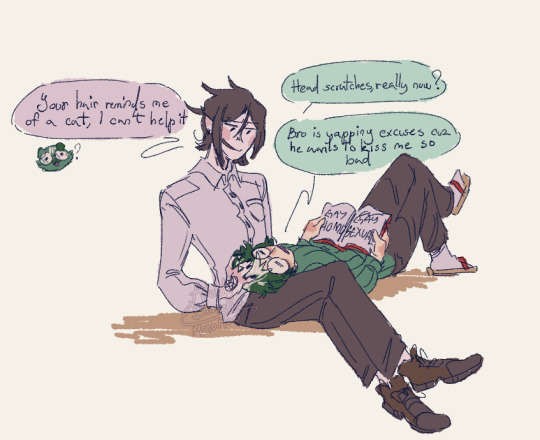
When their wife (grell) is out having a ladies night with madame red and mey-rin, yeah they do cuddle sometimes
#they're restoring energy together so they can team tackle grell when shes home#Seb is also the only one who understands Othello's nerdy talk as well#like no need for translation they just go full on science talk and Sebastian gets it#black butler#kuroshitsuji#black butler art#black butler fanart#kuroshitsuji fanart#kuroshitsuji art#sebastian michaelis#grell sutcliff#grelle sutcliff#othello#black butler sebastian#black butler othello#sebagrellthello#art#my art#doodles#fanart#mono ask
57 notes
·
View notes
Text
oh my god bernard gets batman and dick to help save tim in the last issue and everyone in the family takes that to mean that bear knows about their night jobs. except tim still thinks bear doesn't know. that bear being there was just a coincidence. he just tagged along to save him cause bear is such a standup guy! cue tim doing everything to hide his identity and the family looking at him like he's lost his mind because obviously bernard know tim?? he literally patches you up every night???? why would he not know??????
#bear walking into the dining room: oof that's a nasty cut dick. how'd you get it?#dick: oh well saving the city just does that to you 😉#tim seething internally cause dick is making his job ten times harder: ha ha ha! what a funny thing to say ☺️☺️☺️ such a comedian my brother#dick staring at him like he's grown 2 heads: what.#cass starts pulling off her mask in front of bear#cue tim tackling her into the gotham river#cass sopping wet signing irritatedly: what the hell was that?!#tim whispering; how could you be so careless? u almost told bear your identity!#cass softly: what. the. fuck.#damian casually showing bear his sword collection#tim barging into dami's room out of breath: he's really into medieval history! that's why he likes sword!! no other reason#dami later to bear: we must end this delusion of his#bear: yeah probably. but it's funny watching him come up with so many excuses#bear: yesterday he tried to convince me that the knife wound in his side was really stigmata and that he was a devout catholic#bear: i wanna see what else he's gonna say#dc#bernard dowd#tim drake#timber#timbern
116 notes
·
View notes
Text
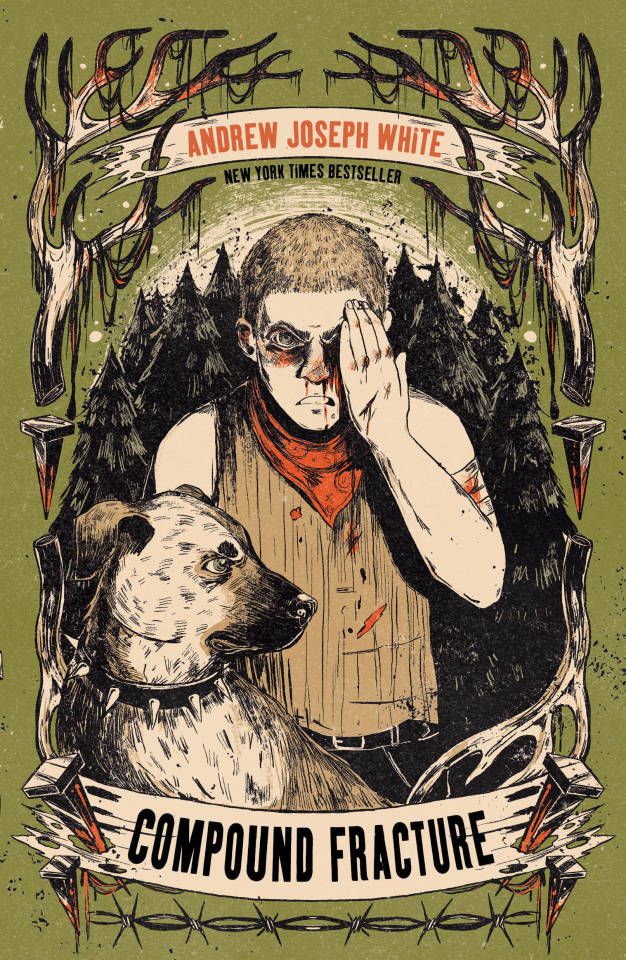
2024 reads / storygraph
Compound Fracture
YA thriller set in rural West Virginia
follows an autistic trans boy who survives being almost killed by the Sheriff’s son after a party, and accidentally kills one of the boys who hurt him when he tries to get back at him
and is pulled head-first back into the 100 year old feud between his & the sheriff’s families, that began when his great-great grandfather was executed after inciting a miner’s rebellion, the grandfather whose ghost has started to haunt him
community & family & socialist revolution
aro-questioning MC
arc from netgalley, out september 3
#Compound Fracture#aroaessidhe 2024 reads#aromantic books#andrew joseph white did it again……#pretty fast paced and gripping! I barely put it down.#Definitely the primal scream of rage the author described it as. Pretty brutal in places. I enjoyed it a lot.#it’s definitely less sff than his other books - the ghostly element is almost subtle - but that worked for me.#I was especially excited for this one because I heard the MC is aromantic and I’m so happy about it I think that was done well#certainly with more nuance and depth than I’ve come to expect from a lot of books; despite the fact that it’s not a major focus#(and yknow takes place over a couple weeks and is still in the questioning stage other than maybe the epilogue)#It’s tackling some very large complex things politically and is very unsubtle and somewhat neat about it#- and I think some aspects could have used more nuance/elaboration? but also maybe that’s just not possible to fit in one little book#the handful of negative reviews I can find I guess I see where they're coming from lol#but yknow. lots of good regardless#and also. appreciation moment for evangeline gallagher's cover art
30 notes
·
View notes
Text
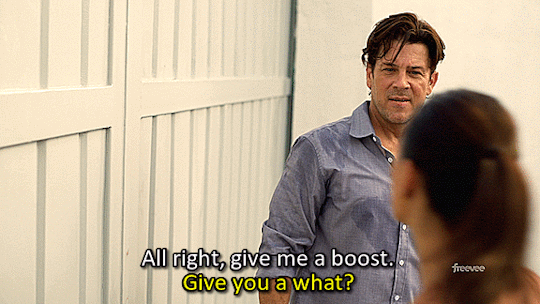
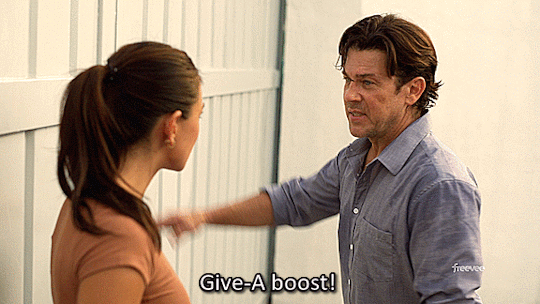

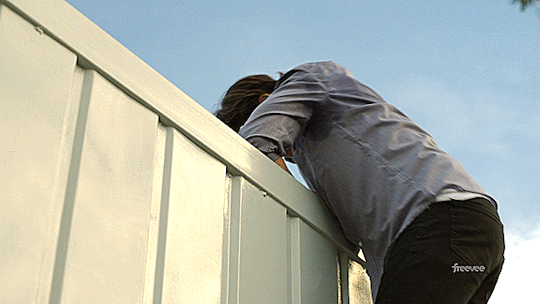

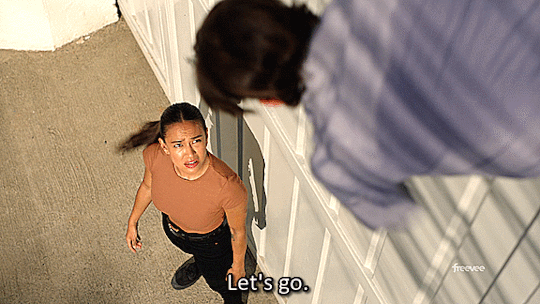


"We're gonna have to hop the gate."
Almost Paradise S02E01 The Magellan Cross.
#almost paradise#alex walker#kai mendoza#christian kane#samantha richelle#alex my beloved dumbass#what the last gif doesn't capture is the thud he makes after he falls off the gate#but this does highlight their differing careers and methods to tackling a problem#alex is (ex) dea and so is used to having to hop fences and bypass security in such a manner#kai on the other hand is a detective and so looks around and gathers clues first before she acts#and of course alex is well known for acting first and (maybe) thinking later!#ghostly'sgifs
78 notes
·
View notes
Text
Twelve, Thirteen, and One
Words: 6k
Rating: G
Themes: Friendship, Self-Giving Love
(Written for the Four Loves Fairytale Retelling Challenge over at the @inklings-challenge! A Cinderella retelling feat. curious critters and a lot of friendship.)
When the clock chimes midnight on that third evening, thirteen creatures look to the girl who showed them all kindness.
—
It’s hours after dark, again, and the human girl still sleeps in the ashes.
The mice notice this—though it happens so often that they’ve ceased to pay attention to her. She smells like everything else in the hearth: ashy and overworked, tinged with the faint smell of herbs from the kitchen.
When she moves or shifts in her sleep (uncomfortable sleep—even they can sense the exhaustion in her posture as she sits slumped against the wall, more willing to seep up warmth from the stone than lie cold elsewhere this time of year), they simply scurry around her and continue combing for crumbs and seeds. They’d found a feast of lentils scattered about once, and many other times, the girl had beckoned them softly to her hand, where she’d held a little chunk of brown bread.
Tonight, she has nothing. They don’t mind—though three of them still come to sniff her limp hand where it lies drooped against the side of her tattered dress.
A fourth one places a little clawed hand on the side of her finger, leaning over it to investigate her palm for any sign of food.
When she stirs, it’s to the sensation of a furry brown mouse sitting in her palm.
It can feel the flickering of her muscles as she wakes—feeling slowly returning to her body. To her credit, she cracks her eyes open and merely observes it.
They’re all but tame by now. The Harsh-Mistress and the Shrieking-Girl and the Angry-Girl are to be avoided like the plague never was, but this girl—the Cinder-Girl, they think of her—is gentle and kind.
Even as she shifts a bit and they hear the dull crack of her joints, they’re too busy to mind. Some finding a few buried peas (there were always some peas or lentils still hidden here, if they looked carefully), some giving themselves an impromptu bath to wash off the dust. The one sitting on her hand is doing the latter, fur fluffed up as it scratches one ear and then scrubs tirelessly over its face with both paws.
One looks up from where it’s discovered a stray pea to check her expression.
A warm little smile has crept up her face, weary and dirty and sore as she seems to be. She stays very still in her awkward half-curl against stone, watching the mouse in her hand groom itself. The tender look about her far overwhelms—melts, even—the traces of tension in her tired limbs.
Very slowly, so much so that they really aren’t bothered by it, she raises her spare hand and begins lightly smearing the soot away from her eyes with the back of her wrist.
The mouse in her palm gives her an odd look for the movement, but has discovered her skin is warmer than the cold stone floor or the ash around the dying fire. It pads around in a circle once, then nudges its nose against her calloused skin, settling down for a moment.
The Cinder-Girl has closed her eyes again, and drops her other hand into her lap, slumping further against the wall. Her smile has grown even warmer, if sadder.
They decide she’s quite safe. Very friendly.
—
The old rat makes his rounds at the usual times of night, shuffling through a passage that leads from the ground all the way up to the attic.
When both gold sticks on the clocks’ moonlike faces point upward, there’s a faint chime from the tower-clock downstairs. He used to worry that the sound would rouse the humans. Now, he ignores it and goes about his business.
There’s a great treasury of old straw in the attic. It’s inside a large sack—and while this one doesn’t have corn or wheat like the ones near the kitchen sometimes do, he knows how to chew it open all the same.
The girl sleeps on this sack of straw, though she doesn’t seem to mind what he takes from it. There’s enough more of it to fill a hundred rat’s nests, so he supposes she doesn’t feel the difference.
Tonight, though—perhaps he’s a bit too loud in his chewing and tearing. The girl sits up slowly in bed, and he stiffens, teeth still sunk into a bit of the fabric.
“Oh.” says the girl. She smiles—and though the expression should seem threatening, all pulled mouth-corners and teeth, he feels the gentleness in her posture and wonders at novel thoughts of differing body languages. “Hello again. Do you need more straw?”
He isn’t sure what the sounds mean, but they remind him of the soft whuffles and squeaks of his siblings when they were small. Inquisitive, unafraid. Not direct or confrontational.
She’s seemed safe enough so far—almost like the woman in white and silver-gold he’s seen here sometimes, marveling at his own confidence in her safeness—so he does what signals not-afraid the best to his kind. He glances her over, twitches his whiskers briefly, and goes back to what he was doing.
Some of the straw is too big and rough, some too small and fine. He scratches a bundle out into a pile so he can shuffle through it. It’s true he doesn’t need much, but the chill of winter hasn’t left the world yet.
The girl laughs. The sound is soft and small. It reminds him again of young, friendly, peaceable.
“Take as much as you need,” she whispers. Her movements are unassuming when she reaches for something on the old wooden crate she uses as a bedside table. With something in hand, she leans against the wall her bed is a tunnel’s-width from, and offers him what she holds. “Would you like this?”
He peers at it in the dark, whiskers twitching. His eyesight isn’t the best, so he finds himself drawing closer to sniff at what she has.
It’s a feather. White and curled a bit, like the goose-down he’d once pulled out the corner of a spare pillow long ago. Soft and long, fluffy and warm.
He touches his nose to it—then, with a glance upward at her softly-smiling face, takes it in his teeth.
It makes him look like he has a mustache, and is a bit too big to fit through his hole easily. The girl giggles behind him as he leaves.
—
There’s a human out in the gardens again. Which is strange—this is a place for lizards, maybe birds and certainly bugs. Not for people, in his opinion. She’s not dressed in venomous bright colors like the other humans often are, but neither does she stay to the manicured garden path the way they do.
She doesn’t smell like unnatural rotten roses, either. A welcome change from having to dart for cover at not just the motions, but the stenches that accompany the others that appear from time to time.
This human is behind the border-shubs, beating an ornate rug that hangs over the fence with a home-tied broom. Huge clouds of dust shake from it with each hit, settling in a thin film on the leaves and grass around her.
She stops for a moment to press her palm to her forehead, then turns over her shoulder and coughs into her arm.
When she begins again, it’s with a sharp WHOP.
He jumps a bit, but only on instinct. However—
A few feet from where he settles back atop the sunning-rock, there’s a scuffle and a sharp splash. Then thrashing—waster swashing about with little churns and splishes.
It’s not the way of lizards to think of doing anything when one falls into the water. There were several basins for fish and to catch water off the roof for the garden—they simply had to not fall into them, not drown. There was little recourse for if they did. What could another lizard do, really? Fall in after them? Best to let them try to climb out if they could.
The girl hears the splashing. She stares at the water pot for a moment.
Then, she places her broom carefully on the ground and comes closer.
Closer. His heart speeds up. He skitters to the safety of a plant with low-hanging leaves—
—and then watches as she walks past his hiding place, peers into the basin, and reaches in.
Her hand comes up dripping wet, a very startled lizard still as a statue clinging to her fingers.
“Are you the same one I always find here?” she asks with a chiding little smile. “Or do all of you enjoy swimming?”
When she places her hand on the soft spring grass, the lizard darts off of it and into the underbrush. It doesn’t go as far as it could, though—something about this girl makes both of them want to stand still and wait for what she’ll do next.
The girl just watches it go. She lets out a strange sound—a weary laugh, perhaps—and turns back to her peculiar chore.
—
A song trails through the old house—under the floorboards—through the walls—into the garden, beneath the undergrowth—and lures them out of hiding.
It isn’t an audible song, not like that of the birds in the summer trees or the ashen-girl murmuring beautiful sounds to herself in the lonely hours. This one was silent. Yet, it reached deep down into their souls and said come out, please—the one who helped you needs your help.
It didn’t require any thought, no more than eat or sleep or run did.
In chains of silver and grey, all the mice who hear it converge, twenty-four tiny feet pattering along the wood in the walls. The rat joins them, but they are not afraid.
When they emerge from a hole out into the open air, the soft slip-slap of more feet surround them. Six lizards scurry from the bushes, some gleaming wet as if they’d just escaped the water trough or run through the birdbath themselves.
As a strange little hoard, they approach the kind girl. Beside her is a tall woman wearing white and silver and gold.
The girl—holding a large, round pumpkin—looks surprised to see them here. The woman is smiling.
“Set the pumpkin on the drive,” the woman says, a soft gleam in her eye. “The rest of you, line up, please.”
Bemused, but with a heartbeat fast enough for them to notice, the girl gingerly places the pumpkin on the stone of the drive. It’s natural for them, somehow, to follow—the mice line in pairs in front of it, the rat hops on top of it, and the lizards all stand beside.
“What are they doing?” asks the girl—and there’s curiosity and gingerness in her tone, like she doesn’t believe such a sight is wrong, but is worried it might be.
The older woman laughs kindly, and a feeling like blinking hard comes over the world.
It’s then—then, in that flash of darkness that turns to dazzling light, that something about them changes.
“Oh!” exclaims the girl, and they open their eyes. “Oh! They’re—“
They’re different.
The mice aren’t mice at all—and suddenly they wonder if they ever were, or if it was an odd dream.
They’re horses, steel grey and sleek-haired with with silky brown manes and tails. Their harnesses are ornate and stylish, their hooves polished and dark.
Instead of a rat, there’s a stout man in fine livery, with whiskers dark and smart as ever. He wears a fine cap with a familiar white feather, and the gleam in his eye is surprised.
“Well,” he says, examining his hands and the cuffs of his sleeves, “I suppose I won’t be wanting for adventure now.”
Instead of six lizards, six footmen stand at attention, their ivory jackets shining in the late afternoon sun.
The girl herself is different, though she’s still human—her hair is done up beautifully in the latest fashion, and instead of tattered grey she wears a shimmering dress of lovely pale green, inlaid with a design that only on close inspection is flowers.
“They are under your charge, now,” says the woman in white, stepping back and folding her hands together. “It is your responsibility to return before the clock strikes midnight—when that happens, the magic will be undone. Understood?”
“Yes,” says the girl breathlessly. She stares at them as if she’s been given the most priceless gift in all the world. “Oh, thank you.”
—
The castle is decorated brilliantly. Flowery garlands hang from every parapet, beautiful vines sprawling against walls and over archways as they climb. Dozens of picturesque lanterns hang from the walls, ready to be lit once the sky grows dark.
“It’s been so long since I’ve seen the castle,” the girl says, standing one step out of the carriage and looking so awed she seems happy not to go any further. “Father and I used to drive by it sometimes. But it never looked so lovely as this.”
“Shall we accompany you in, milady?” asks one of the footmen. They’re all nearly identical, though this one has freckles where he once had dark flecks in his scales.
She hesitates for only a moment, looking up at the pinnacles of the castle towers. Then, she shakes her head, and turns to look at them all with a smile like the sun.
“I think I’ll go in myself,” she says. “I’m not sure what is custom. But thank you—thank you so very much.”
And so they watch her go—stepping carefully in her radiant dress that looked lovelier than any queen’s.
Though she was not royal, it seemed there was no doubt in anyone’s minds that she was. The guards posted at the door opened it for her without question.
With a last smile over her shoulder, she stepped inside.
—
He's straightening the horses' trappings for the fifth time when the doors to the castle open, and out hurries a figure. It takes him a moment to recognize her, garbed in rich fabrics and cloaked in shadows, but it's the girl, rushing out to the gilded carriage. A footman steps forward and offers her a hand, which she accepts gratefully as she steps up into the seat.
“Enjoyable evening, milady?” asks the coachman. His whiskers are raised above the corners of his mouth, and his twinkling eyes crinkle at the edges.
“Yes, quite, thank you!” she breathes in a single huff. She smooths her dress the best she can before looking at him with some urgency. “The clock just struck quarter till—will you be able to get us home?”
The gentle woman in white had said they only would remain in such states until midnight. How long was it until the middle of night? What was a quarter? Surely darkness would last for far more hours than it had already—it couldn’t be close. Yet it seemed as though it must be; the princesslike girl in the carriage sounded worried it would catch them at any moment.
“I will do all I can,” he promises, and with a sharp rap of the reins, they’re off at a swift pace.
They arrive with minutes to spare. He knows this because after she helps him down from the carriage (...wait. That should have been the other way around! He makes mental note for next time: it should be him helping her down. If he can manage it. She’s fast), she takes one of those minutes to show him how his new pocketwatch works.
He’s fascinated already. There’s a part of him that wonders if he’ll remember how to tell time when he’s a rat again—or will this, all of this, be forgotten?
The woman in white is there beside the drive, and she’s already smiling. A knowing gleam lights her eye.
“Well, how was the ball?” she asks, as Cinder-Girl turns to face her with the most elated expression. “I hear the prince is looking for fair maidens. Did he speak with you?”
The girl rushes to grasp the woman’s hands in hers, clasping them gratefully and beaming up at her.
“It was lovely! I’ve never seen anything so lovely,” she all but gushes, her smile brighter and broader than they’d ever seen it. “The castle is beautiful; it feels so alive and warm. And yes, I met the Prince—although hush, he certainly isn’t looking for me—he’s so kind. I very much enjoyed speaking with him. He asked me to dance, too; I had as wonderful a time as he seemed to. Thank you! Thank you dearly.”
The woman laughs gently. It isn’t a laugh one would describe as warm, but neither is it cold in the sense some laughs can be—it's soft and beautiful, almost crystalline.
“That’s wonderful. Now, up to bed! You’ve made it before midnight, but your sisters will be returning soon.”
“Yes! Of course,” she replies eagerly—turning to smile gratefully at coachman and stroke the nearest horses on their noses and shoulders, then curtsy to the footmen. “Thank you all, very much. I could not ask for a more lovely company.”
It’s a strange moment when all of their new hearts swell with warmth and affection for this girl—and then the world darkens and lightens so quickly they feel as though they’ve fallen asleep and woken up.
They’re them again—six mice, six lizards, a rat, and a pumpkin. And a tattered gray dress.
“Please, would you let me go again tomorrow? The ball will last three days. I had such a wonderful time.”
“Come,” the woman said simply, “and place the pumpkin beneath the bushes.”
The woman in white led the way back to the house, followed by an air-footed girl and a train of tiny critters. There was another silent song in the air, and they thought perhaps the girl could hear it too: one that said yes—but get to bed!
—
The second evening, when the door of the house thuds shut and the hoofsteps of the family’s carriage fade out of hearing, the rat peeks out of a hole in the kitchen corner to see the Cinder-Girl leap to her feet.
She leans close to the window and watched for more minutes than he quite understands—or maybe he does; it was good to be sure all cats had left before coming out into the open—and then runs with a spring in her step to the back door near the kitchen.
Ever so faintly, like music, the woman’s laughter echoes faintly from outside. Drawn to it like he had been drawn to the silent song, the rat scurries back through the labyrinth of the walls.
When he hurries out onto the lawn, the mice and lizards are already there, looking up at the two humans expectantly. This time, the Cinder-Girl looks at them and smiles broadly.
“Hello, all. So—how do you do it?” she asks the woman. Her eyes shine with eager curiosity. “I had no idea you could do such a thing. How does it work?”
The woman fixes her with a look of fond mock-sternness. “If I were to explain to you the details of how, I’d have to tell you why and whom, and you’d be here long enough to miss the royal ball.” She waves her hands she speaks. “And then you’d be very much in trouble for knowing far more than you ought.”
The rat misses the girl’s response, because the world blinks again—and now all of them once again are different. Limbs are long and slender, paws are hooves with silver shoes or feet in polished boots.
The mouse-horses mouth at their bits as they glance back at the carriage and the assortment of humans now standing by it. The footmen are dressed in deep navy this time, and the girl wears a dress as blue as the summer sky, adorned with brilliant silver stars.
“Remember—“ says the woman, watching fondly as the Cinder-Girl steps into the carriage in a whorl of beautiful silk. “Return before midnight, before the magic disappears.”
“Yes, Godmother,” she calls, voice even more joyful than the previous night. “Thank you!”
—
The castle is just as glorious as before—and the crowd within it has grown. Noblemen and women, royals and servants, and the prince himself all mill about in the grand ballroom.
He’s unsure of the etiquette, but it seems best for her not to enter alone. Once he escorts her in, the coachman bows and watches for a moment—the crowd is hushed again, taken by her beauty and how important they think her to be—and then returns to the carriage outside.
He isn’t required in the ballroom for much of the night—but he tends to the horses and checks his pocketwatch studiously, everything in him wishing to be the best coachman that ever once was a rat.
Perhaps that wouldn’t be hard. He’d raise the bar, then. The best coachman that ever drove for a princess.
Because that was what she was—or, that was what he heard dozens of hushed whispers about once she’d entered the ball. Every noble and royal and servant saw her and deemed her a grand princess nobody knew from a land far away. The prince himself stared at her in a marveling way that indicated he thought no differently.
It was a thing more wondrous than he had practice thinking. If a mouse could become a horse or a rat could become a coachman, couldn’t a kitchen-girl become a princess?
The answer was yes, it seemed—perhaps in more ways than one.
She had rushed out with surprising grace just before midnight. They took off quickly, and she kept looking back toward the castle door, as if worried—but she was smiling.
“Did you know the Prince is very nice?” she asks once they’re safely home, and she’s stepped down (drat) without help again. The woman in white stands on her same place beside the drive, and when Cinder-Girl sees her, she waves with dainty grace that clearly holds a vibrant energy and sheer thankfulness behind it. “I’ve never known what it felt like to be understood. He thinks like I do.”
“How is that?” asks the woman, quirking an amused brow. “And if I might ask, how do you know?”
“Because he mentions things first.” The girl tries to smother some of the wideness of her smile, but can’t quite do so. “And I've shared his thoughts for a long time. That he loves his father, and thinks oranges and citrons are nice for festivities especially, and that he’s always wanted to go out someday and do something new.”
—
The third evening, the clouds were dense and a few droplets of rain splattered the carriage as they arrived.
“Looks like rain, milady,” said the coachman as she disembarked to stand on water-spotted stone. “If it doesn’t blow by, we’ll come for ye at the steps, if it pleases you.”
“Certainly—thank you,” she replies, all gleaming eyes and barely-smothered smiles. How her excitement to come can increase is beyond them—but she seems more so with each night that passes.
She has hardly turned to head for the door when a smattering of rain drizzles heavily on them all. She flinches slightly, already running her palms over the skirt of her dress to rub out the spots of water.
Her golden dress glisters even in the cloudy light, and doesn’t seem to show the spots much. Still, it’s hardy an ideal thing.
“One of you hold the parasol—quick about it, now—and escort her inside,” the coachman says quickly. The nearest footman jumps into action, hop-reaching into the carriage and falling back down with the umbrella in hand, unfolding it as he lands. “Wait about in case she needs anything.”
The parasol is small and not meant for this sort of weather, but it's enough for the moment. The pair of them dash for the door, the horses chomping and stamping behind them until they’re driven beneath the bows of a huge tree.
The footman knows his duty the way a lizard knows to run from danger. He achieves it the same way—by slipping off to become invisible, melting into the many people who stood against the golden walls.
From there, he watches.
It’s so strange to see the way the prince and their princess gravitate to each other. The prince’s attention seems impossible to drag away from her, though not for many’s lack of trying.
Likewise—more so than he would have thought, though perhaps he’s a bit slow in noticing—her focus is wholly on the prince for long minutes at a time.
Her attention is always divided a bit whenever she admires the interior of the castle, the many people and glamorous dresses in the crowd, the vibrant tables of food. It’s all very new to her, and he’s not certain it doesn’t show. But the Prince seems enamored by her delight in everything—if he thinks it odd, he certainly doesn’t let on.
They talk and laugh and sample fine foods and talk to other guests together, then they turn their heads toward where the musicians are starting up and smile softly when they meet each other’s eyes. The Prince offers a hand, which is accepted and clasped gleefully.
Then, they dance.
Their motions are so smooth and light-footed that many of the crowd forgo dancing, because admiring them is more enjoyable. They’re in-sync, back and forth like slow ripples on a pond. They sometimes look around them—but not often, especially compared to how long they gaze at each other with poorly-veiled, elated smiles.
The night whirls on in flares of gold tulle and maroon velvet, ivory, carnelian, and emerald silks, the crowd a nonstop blur of color.
(Color. New to him, that. Improved vision was wonderful.)
The clock strikes eleven, but there’s still time, and he’s fairly certain he won’t be able to convince the girl to leave anytime before midnight draws near.
He was a lizard until very recently. He’s not the best at judging time, yet. Midnight does draw near, but he’s not sure he understands how near.
The clock doesn’t quite say up-up. So he still has time. When the rain drums ceaselessly outside, he darts out and runs in a well-practiced way to find their carriage.
—
Another of the footmen comes in quickly, having been sent in a rush by the coachman, who had tried to keep his pocketwatch dry just a bit too long. He’s soaking wet from the downpour when he steps close enough to get her attention.
She sees him, notices this, and—with a glimmer of recognition and amusement in her eyes—laughs softly into her hand.
ONE—TWO— the clock starts. His heart speeds up terribly, and his skin feels cold. He suddenly craves a sunny rock.
“Um,” he begins awkwardly. Lizards didn’t have much in the way of a vocal language. He bows quickly, and water drips off his face and hat and onto the floor. “The chimes, milady.”
THREE—FOUR—
Perhaps she thought it was only eleven. Her face pales. “Oh.”
FIVE—SIX—
Like a deer, she leaps from the prince’s side and only manages a stumbling, backward stride as she curtsies in an attempt at a polite goodbye.
“Thank you, I must go—“ she says, and then she’s racing alongside the footman as fast as they both can go. The crowd parts for them just enough, amidst loud murmurs of surprise.
SEVEN—EIGHT—
“Wait!” calls the prince, but they don’t. Which hopefully isn’t grounds for arrest, the footman idly thinks.
They burst through the door and out into the open air.
NINE—TEN—
It has been storming. The rain is crashing down in torrents—the walkways and steps are flooded with a firm rush of water.
She steps in a crevice she couldn’t see, the water washes over her feet, and she stumbles, slipping right out of one shoe. There’s noise at the door behind them, so she doesn’t stop or even hesitate. She runs at a hobble and all but dives through the open carriage door. The awaiting footman quickly closes it, and they’re all grasping quickly to their riding-places at the corners of the vehicle.
ELEVEN—
A flash of lightning coats the horses in white, despite the dark water that’s soaked into their coats, and with a crack of the rains and thunder they take off at a swift run.
There’s shouting behind them—the prince—as people run out and call to the departing princess.
TWELVE.
Mist swallows them up, so thick they can’t hear or see the castle, but the horses know the way.
The castle’s clock tower must have been ever-so-slightly fast. (Does magic tell truer time?) Their escape works for a few thundering strides down the invisible, cloud-drenched road—until true midnight strikes a few moments later.
—
She walks home in the rain and fog, following a white pinprick of light she can guess the source of—all the while carrying a hollow pumpkin full of lizards, with an apron pocket full of mice and a rat perched on her shoulder.
It’s quite the walk.
—
The prince makes a declaration so grand that the mice do not understand it. The rat—a bit different now—tells them most things are that way to mice, but he’s glad to explain.
The prince wants to find the girl who wore the golden slipper left on the steps, he relates. He doesn’t want to ask any other to marry him, he loved her company so.
The mice think that’s a bit silly. Concerning, even. What if he does find her? There won’t be anyone to secretly leave seeds in the ashes or sneak them bread crusts when no humans are looking.
The rat thinks they’re being silly and that they’ve become too dependent on handouts. Back in his day, rodents worked for their food. Chewing open a bag of seed was an honest day’s work for its wages.
Besides, he confides, as he looks again out the peep-hole they’ve discovered in the floor trim of the parlor. You’re being self-interested, if you ask me. Don’t you want our princess to find a good mate, and live somewhere spacious and comfortable, free of human-cats, where she’d finally have plenty to eat?
It’s hard to make a mouse look appropriately chastised, but that question comes close. They shuffle back a bit to let him look out at the strange proceedings in the parlor again.
There are many humans there. The Harsh-Mistress stands tall and rigid at the back of one of the parlor chairs, exchanging curt words with a strange man in fine clothes with a funny hat. Shrieking-Girl and Angry-Girl stand close, scoffing and laughing, looking appalled.
Cinder-Girl sits on the chair that’s been pulled to the middle of the room. She extends her foot toward a strange golden object on a large cushion.
The shoe, the rat notes so the mice can follow. They can’t quite see it from here—poor eyesight and all.
Of course, the girl’s foot fits perfectly well into her own shoe. They all saw that coming.
Evidently, the humans did not. There’s absolute uproar.
“There is no possible way she’s the princess you’re looking for!” declares Harsh-Mistress, her voice full of rage. “She’s a kitchen maid. Nothing royal about her.”
“How dare you!” Angry-Girl rages. “Why does it fit you? Why not us?”
“You sneak!” shrieks none other than Shrieking-Girl. “Mother, she snuck to the ball! She must have used magic, somehow! Princes won’t marry sneaks, will they?”
“I think they might,” says a calm voice from the doorway, and the uproar stops immediately.
The Prince steps in. He stares at Cinder-Girl.
She stares back. Her face is still smudged with soot, and her dress is her old one, gray and tattered. The golden slipper gleams on her foot, having fit as only something molded or magic could.
A blush colors her face beneath the ash and she leaps up to do courtesy. “Your Highness.”
The Prince glances at the messenger-man with the slipper-pillow and the funny hat. The man nods seriously.
The Prince blinks at this, as if he wasn’t really asking anything with his look—it’s already clear he recognizes her—and meets Cinder-Girl’s gaze with a smile. It’s the same half-nervous, half-attemptingly-charming smile as he kept giving her at the ball.
He bows to her and offers a hand. (The rat has to push three mice out of the way to maintain his view.)
“It’s my honor,” he assures her. “Would you do me the great honor of accompanying me to the castle? I’d had a question in mind, but it seems there are—“ he glances at Harsh-Mistress, who looks like a very upset rat in a mousetrap. “—situations we might discuss remedying. You’d be a most welcome guest in my father’s house, if you’d be amenable to it?”
It’s all so much more strange and unusual than anything the creatures of the house are used to seeing. They almost don’t hear it, at first—that silent song.
It grows stronger, though, and they turn their heads toward it with an odd hope in their hearts.
—
The ride to the castle is almost as strange as that prior walk back. The reasons for this are such:
One—their princess is riding in their golden carriage alongside the prince, and their chatter and awkward laughter fills the surrounding spring air. They have a good feeling about the prince, now, if they didn’t already. He can certainly take things in stride, and he is no respecter of persons. He seems just as elated to be by her side as he was at the ball, even with the added surprise of where she'd come from.
Two—they have been transformed again, and the woman in white has asked them a single question: Would you choose to stay this way?
The coachman said yes without a second thought. He’d always wanted life to be more fulfilling, he confided—and this seemed a certain path to achieving that.
The footmen might not have said yes, but there was something to be said for recently-acquired cognition. It seemed—strange, to be human, but the thought of turning back into lizards had the odd feeling of being a poor choice. Baffled by this new instinct, they said yes.
The horses, of course, said things like whuff and nyiiiehuhum, grumph. The woman seemed to understand, though. She touched one horse on the nose and told it it would be the castle’s happiest mouse once the carriage reached its destination. The others, it seemed, enjoyed their new stature.
And three—they are heading toward a castle, where they have all been offered a fine place to live. The Prince explains that he doesn’t wish for such a kind girl to live in such conditions anymore. There’s no talk of anyone marrying—just discussions of rooms and favorite foods and of course, you’ll have the finest chicken pie anytime you’d like and I can’t have others make it for me! Lend me the kitchens and I’ll make some for you; I have a very dear recipe. Perhaps you can help. (Followed in short order by a ...Certainly, but I’d—um, I’d embarrass myself trying to cook. You would teach me? and a gentle laugh that brightened the souls of all who could hear it.)
“If you’d be amenable to it,” she replies—and in clear, if surprised, agreement, the Prince truly, warmly laughs.
“Milady,” the coachman calls down to them. “Your Highness. We’re here.”
The castle stands shining amber-gold in the light of the setting sun. It will be the fourth night they’ve come here—the thirteen of them and the one of her—but midnight, they realize, will not break the spell ever again.
One by one, they disembark from the carriage. If it will stay as it is or turn back into a pumpkin, they hadn't thought to ask. There’s so much warmth swelling in their hearts that they don’t think it matters.
The girl, their princess, smiles—a dear, true smile, tentative in the face of a brand new world, but bright with hope—and suddenly, they’re all smiling too.
She steps forward, and they follow. The prince falls into step with her and offers an arm, and their glances at each other are brimming with light as she accepts.
With her arm in the arm of the prince, a small crowd of footmen and the coachman trailing behind, and a single grey mouse on her shoulder, the once-Cinder-Girl walks once again toward the palace door.
#Well this wasn't my first Cinderella retelling idea that I was excited about BUT -#since that one was turning into a tangle of Too Much Going On (though it's currently at 5k and maybe 70% done; I still plan to finish it)#I tried this one instead!#pros: I think I actually wrote myself out of writer's block? Which is AWESOME#And I feel like I'm starting to notice what needs fixed and mended about my writing; which is very helpful!#cons: due to having the additional pro of a very socially growth-filled few weeks IRL; I did not do much about that fact#please excuse the general lack of editing thus far#I have also learned that I may want to be at least a Level 5 Fairy Tale Reteller#before I tackle stories with hundreds of years of popular retellings and versions?#Although this one came much more easily than my first idea; it still felt more difficult to write than my Nix Nought Nothing story.#So another pro - I learned that I enjoy writing about lesser-known tales the most! Next time I might try a fun obscure one.#All in all this was a ton of fun!! Thanks for running the challenge! Apologies for being nearly late - I had a wonderful time!#I hope you all enjoy! <3#inklingschallenge#four loves fairy tale retelling challenge#love: philia#love: agape#Cinderella#story: complete#basil writes#salt and light
34 notes
·
View notes